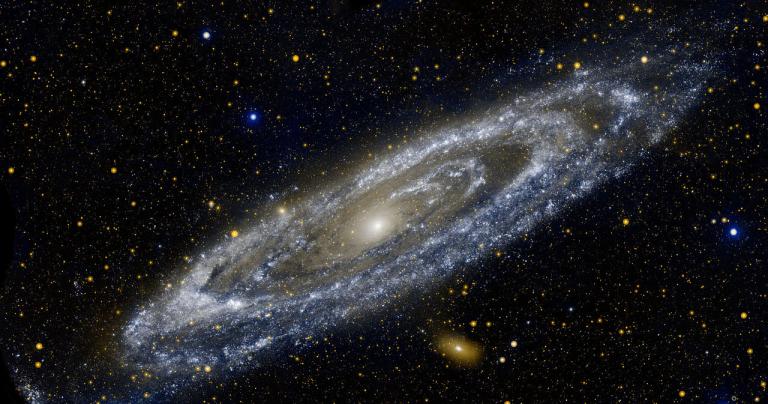When we talk about “the Universe” there are almost always unstated assumptions behind our words, assumptions that may or may not be true but that say something about how we see the world and the way it works. Many times these assumptions are not in alignment with the religion we practice, because we’ve never given them any thought. We’ve just always assumed they were true, and when someone challenges us on them, we get defensive.

When I talk to Christians about finding the Divine in Nature, they almost always agree with me. Our vocabulary may differ but we’re on common ground.
When I talk about magic I usually get a smile and a look that says “isn’t that quaint?” Many times, though, that’s followed up with a request to work a spell or do a reading for them. The belief in magic dies hard, if it dies at all.
But when I talk about the many Gods, I usually get an angry response. “There is only one God!!!”
Some of this anger comes from ignorance and some comes from religious bigotry. But mostly, polytheism breaks their worldview – their foundational assumptions about the world and the way it works. They’ve always been told there is only one God and they’ve never questioned it. To accept that a reasonable person might think otherwise forces them to consider that they might be wrong.
And considering that you might be wrong is a difficult thing indeed.
This post is not about the inability of some Christians to accept that they might be wrong, or to treat their polytheist neighbors like neighbors despite our religious differences. Rather, I hope to use a situation many Pagans have experienced to get us to look at our own foundational assumptions – to consider that there are things we believe simply because we’ve always assumed they were true, even though it’s likely they aren’t.
I talked about worldview and foundational assumptions in The Path of Paganism. I gave it its own chapter in Paganism In Depth: “Seeing the World in a Different Way.” It was the first module in Paganism In Depth – The On-Line class.
And I still feel like I’m not getting my point across. I’m trying to get people (some people – not everyone) to “look over there” and they’re not seeing the elephant in the room… or the lion in the bushes. Here’s another try.
What it means when you talk about “the Universe”
“If you speak, the Universe responds.”
“The Universe has something good for me.”
“We can trust the Universe.”
These are three examples of countless statements I see on a regular basis. They’re pleasant and comforting. They’re also almost certainly false, but that’s not the point of this post. The point of this post is to consider what it would mean if they were true.
What are the unstated foundational assumptions behind these claims?
Bad assumption: the Universe is an omniscient individual
Look at the three sample statements. Consider others you’ve heard. Behind them is the assumption that the Universe is an individual, and an omniscient individual at that. “The Universe” is listening to you, paying attention to you, and trying to help you live a better life.
This is monotheism lite. It replaces the one not-very-nice creator God of the Abrahamic religions with a blank slate onto which we can project our desires – in particular, the desire for a divine parent to watch out for us. In a more mature form it could be panentheism, but in no way is it polytheism. And despite what some thing, it has nothing to do with the Neoplatonic idea of “The One.”
A better assumption is that “the Universe” is a collective noun for everything that exists in the material world (and possibly the non-material world as well). All of these things – these persons – are connected, but in the way that a family is a collection of individuals, not one person… and certainly not one person who knows, sees, and hears all.
Bad assumption: the well-being of individual humans is of ultimate importance
It takes a certain amount of arrogance to believe the Universe cares about you. A hurricane just wiped out the Bahama Islands. Refugees are suffering and dying in this country and elsewhere in the world. Whole species are going extinct. But “the Universe” is looking out for your spiritual growth?
This assumption comes straight out of Christianity:
Look at the birds of the air; they neither sow nor reap nor gather into barns, and yet your heavenly Father feeds them. Are you not of more value than they? … strive first for the kingdom of God and his righteousness, and all these things will be given to you as well.
The teachings of Jesus are mostly a good way to live your life, even if the doctrines made up about Jesus aren’t. But these words – whether they were said by Jesus or just attributed to Jesus – are flat-out wrong.
A better assumption is that while we are beings of inherent worth and dignity, we are of no greater importance than any other person – human or otherwise. Our species is of no greater importance than every other species. Our greater intelligence (another assumption, one that I frequently have reason to doubt) means we have greater power, but also a greater responsibility to use it for the good of all, not merely for ourselves.
Bad assumption: the Universe has a plan
This is another holdover from Christianity, especially the vague generic Evangelicalism that dominates the United States. “It’s all part of God’s plan” is usually said to hurting people by those who would rather offer empty words than tangible actions.
There is no Grand Plan in Paganism, either ancient or modern. The many Gods have many plans and goals as They spread Their values and virtues. Sometimes those plans are in harmony with each other and other times they’re in conflict, as with the story of Osiris and Set.
I sometimes think I speak of “the Gods” too often – that I imply They’re all on the same page all the time. There are some things we can say about Gods as a class of persons (namely, They are all virtuous), but They are many, not one. And so They have no unified plan.
A better assumption is that life is far more random than we care to admit. We can form our own plans and work to bring good things into our lives (using both magic and mundane effort), but at the end of the day no one is “in control” – not the Universe, not Yahweh, not the Illuminati. For better or for worse, we’re on our own. We’re stronger together than alone, but that’s another post for another time.
The assumptions behind “we are the Universe contemplating itself”
Philosopher Alan Watts said “through our eyes, the universe is perceiving itself.” Astronomer Carl Sagan said “we are the way for the cosmos to know itself.” At a certain level these statements are true. But while many bad assumptions are grounded in Christianity, this quote is a declaration of atheism.
The ultimate nature of the Universe, of life and being, is properly in the realm of both science and philosophy, of astronomers and mystics. But the answers that come from either camp have religious implications.
If we are the Universe contemplating itself, then there is nothing in the Universe bigger than us. There is no consciousness bigger than human consciousness. There is no knowledge bigger than human knowledge.
Now, it’s entirely possible that this is true. But if there is nothing bigger than us, then there are no Gods: neither as the monotheists conceive of their one God or as polytheists conceive of our many Gods.
A better understanding of the Universe is expressed in a different quote, this one from biologist J.B.S. Haldane: “the universe is not only queerer than we suppose, but queerer than we can suppose.” To which I would add “and we’re a part of it all.”
Why all this matters
As with Christians who get angry when a polytheist tells them the Gods are many, Pagans and others often get angry when someone tells them that the Universe isn’t looking out for them. It’s hard when you’re challenged on something you’ve always assumed was true – especially when you really want it to be true.
But when we speak of “the Universe” as though it’s an individual being, we reinforce the assumptions of monotheism. That makes it harder to practice our polytheism deeply and authentically. When we make statements about the Universe that assume there are no Gods, it becomes virtually impossible to practice polytheism deeply and authentically.
Being a Pagan and a polytheist in a world dominated by Christianity and atheism is hard. Doing it well requires challenging our assumptions about the world and the way it works, and changing the assumptions that don’t support us on our journey.



















